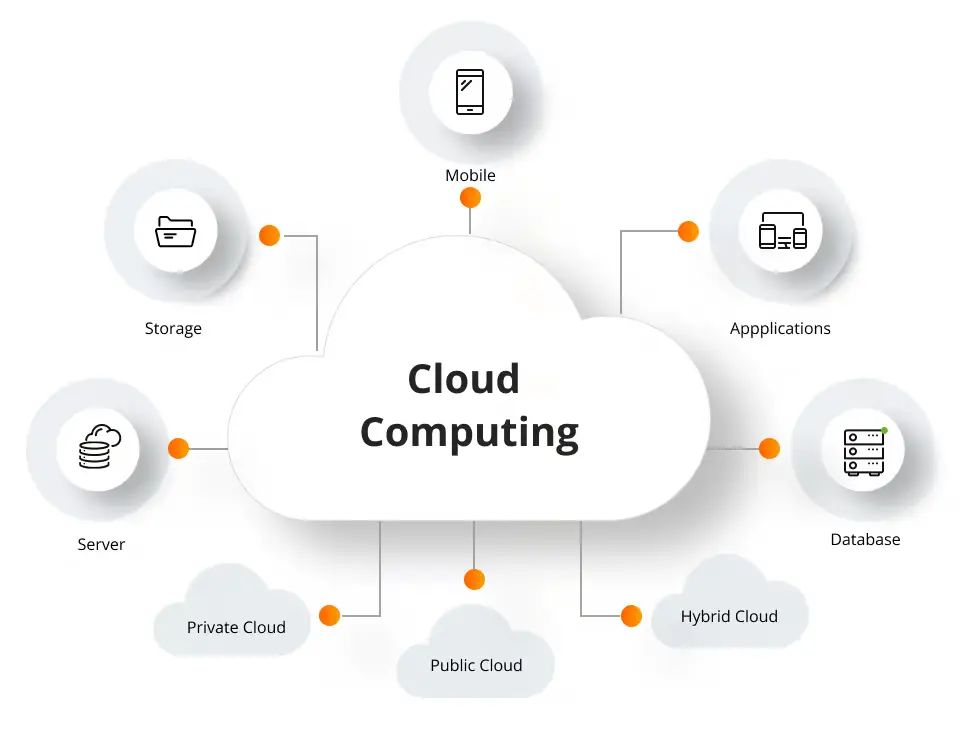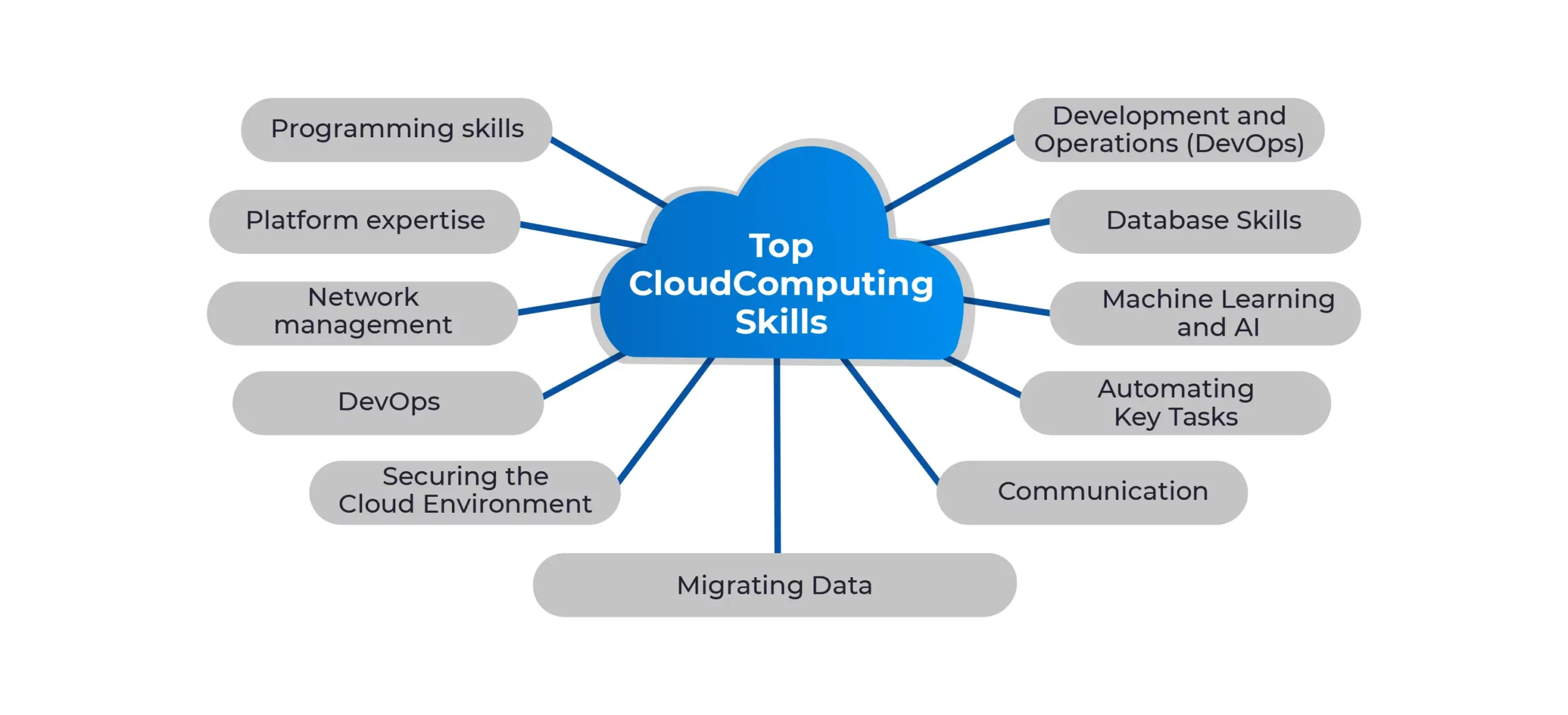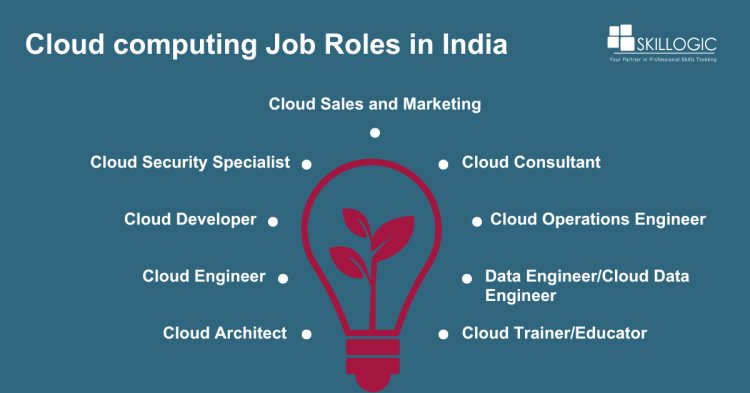Why Choose IIT Palakkad for Exclusive Cloud Computing Certification
Table of Contents

The scope of cloud computing in the coming years is expected to grow remarkably, with more businesses choosing to adopt and implement digital strategies. According to Gartner predictions, the global spending on public cloud service will reach approximately ₹5.9 trillion ($723 billion) in 2025. Isn’t it surprising? Well yes. This is all because hybrid and multi-cloud strategies will dominate and provide more flexibility and cost-effectiveness to companies. In fact, the reason cloud computing is being used is its scalability, reliability, and enhanced security features, making it an important asset in today’s modern digital system.
Those who want to succeed in these thriving sectors must master the skills across cloud services platforms, such as programming, database management, networking, security, AI/ML, and cost management.
The cloud computing scope in 2025 is expected to grow significantly, with businesses adopting digital-first strategies and utilising technologies like AI, machine learning, IoT, and edge computing. This is where one of the most popular certifications offered by IIT Palakkad comes in. Their cloud programming provides opportunities to push yourself forward and climb the success ladder in the tech field like never before.
For professionals who want to be a part of the technology shift or understand the fundamental concept of cloud systems, this course is a perfect deal. But before that, let’s dig into some more details about what makes cloud computing a great career choice, why you should consider IIT Palakkad for Exclusive Cloud Computing Certification, and what career opportunities await you in cloud computing. Now, just grab your laptop and read this blog to learn how you can be a part of technology.

*future-processing.com
Why is Cloud Computing a Great Career Choice?
As mentioned above, cloud computing is a hot topic these days! Before we get into career prospects, let’s explore a little bit about what cloud computing really is and why it is making waves in the tech world. Imagine being able to access your data from virtually anywhere. Sounds cool, doesn’t it? Welcome to the world of cloud computing: it allows businesses to use virtualisation and have their IT infrastructure so that their employees can retrieve their data wherever they may be situated. Given below are some of the reasons that support the reasons for choosing a career in cloud computing.
A Flourishing Career Path
First, the cloud computing field is among the fast-gaining ground in the IT sector. The cloud computing professional manages, maintains, and secures these cloud systems. And guess what? The demand for cloud computing specialists is on the rise!
On a daily basis, organisations of all sizes are moving to the cloud not only to save money but also because this shift creates an ongoing demand for professionals who can design, manage, and keep cloud systems operating. Further, jobs in cloud computing come packed with some pretty hefty paychecks! With cloud computing certification, you can consider yourself on the receiving end of fatter salaries no matter which industry you find yourself in.
Climbing the Corporate Ladder
What is cooler than when experience and certifications can take senior positions with increased responsibility (and yes, higher salaries, too)? Indeed, having the knowledge and common skills required for the cloud computing field can level up the game of excelling in your career. It is like levelling up in a game, only in your career!
Wide Opportunities Ahead
Cloud computing does not operate in a linear fashion; it opens as many different job positions. You can be anything from a cloud architect to a cloud developer and security engineer, not forgetting a data analyst. Such versatility can assist you in finding a place through it that fits your liking.

*edoxi.com
Top 10 Exciting Cloud Computing Careers to Explore
If you are curious about cloud computing career prospects, you are in for some goodness! So many great choices you can make in this flourishing field. Let’s introduce 10 exciting roles you can consider and see which one captures your attention!
1. Cloud Network Engineer
Cloud Network Engineers are responsible for migrating existing networks to public, private, or hybrid cloud systems. The purpose of doing that is to make a company more flexible and productive. They work along with IT teams, setting up, configuring, and maintaining cloud networks. You can think of it as bridging the technological gap and bridging teamwork.
2. Systems Administrator
If you are one who loves keeping systems running smoothly, then this one’s for you! Systems Administrators manage and maintain computer networks, mostly shared by multiple users. You will ensure that everyone will have Wi-Fi and connections to access their data. With your knowledge of both software and hardware, you will be the one troubleshooting when unwanted issues hit the operation of systems. Pursuing cloud computing certification courses can enhance your expertise and open new doors in this essential role.
3. Cloud Engineer
Cloud engineers are the architects of the cloud infrastructure. They are responsible for designing, extending and enhancing cloud solutions. They also assist companies to move their applications into the cloud. Their day-to-day jobs involve identifying problems and deploying systems while collaborating with other tech professionals to get the most out of cloud technology. So, if you’re passionate about building the future of technology, consider taking cloud computing certification courses to sharpen your skills and advance your career.
4. Backend Developer
As the backend developer, you will be creating and managing the behind-the-scenes tech that makes websites work. You will work on the server side, connecting the front end with all the necessary functionalities. The primary focus will be on things such as data storage, security, and smooth operation of the sites. Thus, to thrive in this role, cloud computing courses can provide you with valuable insights and knowledge.
5. Java Cloud Developer
Like coding in Java? Think about being a Java Cloud Developer! You will get a chance to design and manage cloud-native applications in Java while working with other software engineers to construct business apps running in the cloud. With the right cloud computing certification programme, you can learn everything from design to deployment, putting security and efficiency into all your solutions.
6. Full-Stack Developer
A Full-Stack Developer could be called the Jack-of-All-Trades! Here, you work on both the front-end and back-end of any website and create a seamless user experience. With your intuition into what programming languages connect, you will make sure everything works in harmony between both sides of an application.
7. Front-End Developer
Creating an engaging user experience while browsing the web is the key to success for any Front-End Developer! You get to consult with your clients to find out what their visionary thinking is and build their web experience with your design and programming skills. You will also be involved in ongoing testing and debugging to keep things running smoothly. It’s all about making the web a gorgeous and functional place!
8. Cloud Solutions Architect
We call Cloud Solutions Architects the strategists of the cloud world! They design and implement cloud solutions adapted to business needs. Furthermore, they are also adept in all things regarding different cloud-based platforms and help organisations make the right decisions, helping clients with the cloud journey.
9. Cloud Security Specialist
When the world is dealing with data breaches, Cloud Security Specialists ensure that sensitive data does not get leaked. You will administer and develop security compliance actions to prevent cloud data threats. You have a big role in creating a safe cloud world for companies.
10. DevOps Engineer
DevOps engineers wear many hats; thus, they become collaboration heroes! Between the development and operations, you will work together to nail down processes and improve efficiency. With a primary focus on automation and continuous integration, you will help speed up deployments of applications while ensuring they are running reliably.

*skillogic.com
How the Exclusive Cloud Computing Certification of IIT Palakkad Can Be A Game Changer
Along with technical skills in IT, networking, and programming, many entry-level cloud computing professionals get certified. These certifications help them learn more and show potential employers that they have the important cloud knowledge needed to do their jobs well. One of them is the exclusive cloud computing certification of IIT Palakkad, which we have been talking about in this blog. The course is uniquely tailored to pull you up the success ladder in the technology field like never before. Be it for a professional wanting a role in this technology or you want to take your ambition further, this course would fit in snugly.
But, before we go further discussing the syllabus and features, let us check out the reasons why IIT Palakkad happens to be one of the top choices for cloud computing certification.
A Premier Institution
Since its inception in 2015, the Indian Institute of Technology, Palakkad, has been striving towards building an educational environment filled with innovations and excellence, serving as pioneering in cross-disciplinary research and possessing a vision which substantiates the thought that education is the best tool to bring about change.
Key Advantages of IIT Palakkad
- Accredited Certification: You will earn a post-graduate certificate from IIT Palakkad, a name valued in the tech industry.
- Expert Faculty: Be taught by renowned faculty and industry experts with vast knowledge and experience.
- Hands-On Learning: This Cloud Computing Certification program contains practical sessions and industry-relevant projects to equip students with practical skills and theoretical knowledge.
- The Vibrant Alumni Network: Being part of IIT Palakkad means being part of the very vibrant alumni network, which can be immensely helpful in networking and career opportunities.
- Interdisciplinary Curriculum: The course encapsulates a niche range of topics, from cloud foundations to big data management, thereby guaranteeing an in-depth understanding of this field.
About the Programme:
The PG Certificate Programme in Cloud Computing at IIT Palakkad is one of the most affordable and high-quality programs available. This course is your chance to advance your career in the exciting field of cloud technology like never before!
If you’re eager to be part of the technology revolution and want to understand how cloud systems work, this Cloud Computing Certification course is perfect for you. You’ll learn the fundamental concepts behind cloud computing and discover how technologies like Amazon AWS, Microsoft Azure, and OpenStack come into play. The curriculum covers essential topics, including cloud computing core concepts, Big Data Programming, and distributed systems like virtualisation, data parallelism, and performance analysis.
Plus, you’ll gain hands-on experience through projects that will help you understand cloud infrastructure better. This program is designed to equip you with the skills you need to succeed in the cloud computing world!
How Jaro Education Can Guide You in Your Career Advancement
Jaro Education is an online higher education and upskilling company. With more than a decade of experience in this sector, we are here to transform the careers of professionals. Whether you’re a working professional entry-level candidate or entrepreneur, we bring the best executive online education programmes that cater to our interests. In addition, we have been recognised for transforming online education in India by offering over 150 management, technology, and techno-functional programs in partnership with leading institutes. In fact, for most of the courses offered by prestigious IIM and IITs, we act as a technology and marketing partner.
If you’re registering for the Exclusive Cloud Computing Certification of IIT Palakkad through us, you can access the Jaro Advantage. It will give you the benefit of accessing our dedicated support, network building, alumni connection, immersive learning experience, and many more.
For this programme, we also provide Jaro Expedite – Career Booster benefits which include:
- Profile Building: We continuously and precisely help candidates build their profiles and scrutinise their LinkedIn profiles.
- Resume Review: Our in-house team carefully curates resume reviews and ensures that you are ready for your upcoming interviews.
- Placement Assistance: We will always be there to offer career assistance based on your profile and academic goals.
- Career Enhancement Sessions: Connecting top talent with organisations through excellent sessions led by industry leaders
The Bottom Line
Cloud computing is not just a career choice; it’s a gateway to endless possibilities. Whether you dream of becoming a cloud architect or a cloud consultant, this field is bursting with opportunities. If you’ve read this far, you likely feel the excitement of what’s ahead. The rapid growth of cloud technology offers not only competitive salaries but also the chance to climb the career ladder swiftly.
If you have a passion for technology and a knack for problem-solving, this is your moment. The world of cloud computing is one of the most vibrant and innovative sectors out there. Don’t miss this chance to transform your future. Consider registering for the Exclusive Cloud Computing Certification from IIT Palakkad through Jaro Education. It could be the first step toward a fulfilling and rewarding career that truly resonates with your aspirations. Enjoy the journey ahead!
Frequently Asked Questions
Yes. The future of cloud computing seems very promising. The continued demand for cloud technology adoption in every company- whether small or large, ensures a sustained demand for cloud professionals.
Yes! Start by learning the right skills and tools required to be in this field. You can enrol in an excluding cloud computing certification programme offered by IIT Palakkad. Further, you can also set your personal cloud environment and build a portfolio of projects. For further guidance on how you can build a thriving career in Cloud computing, connect with the team at Jaro Education.
Some of the top companies looking for Cloud engineers in India are TCS, Accenture, Tech Mahindra, LTIMindtree, Wipro, IBM, Cognizant, and Capgemini.
Pursuing a career in cloud computing offers numerous benefits, including strong demand for skilled professionals, attractive salaries, and ample opportunities for career growth and development.


















